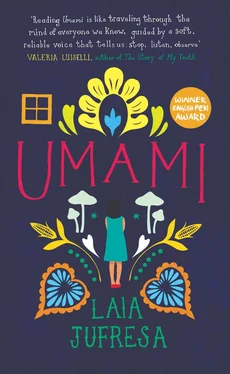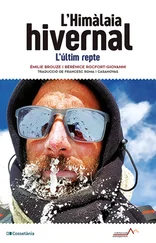The lanky boy watches her, laughing nervously until Beto emerges onto the rooftop. The lanky boy leaves them to it. Pina tenses up, then climbs onto the front seat to watch her parents argue in the rain. Her mom’s happy and her dad’s furious, that much she can tell from the camper. Between them, they manage to pick up the bathtub. It’s heavy. They put it down. He shouts. She gesticulates. They pick it up again and inch their way towards the edge of the rooftop. In one single motion, they tip the tub over. Brown water pours out. And that is the last image Pina has of her parents together: they’re standing on the roof of a house in the middle of the scum, tipping filthy water onto an already flooded street.
I planted the corn. The rest is just watering, tending, and jotting down any observations in the margins of my books. One of them is The Urban Milpa Manual , published by our very own Alf in 1974. On the front there’s a photo of the mews before it was the mews. In the background you can see the huge house that was here originally and the rest of the plot, which is fully planted, with a group of hippies working ‘the field’. Among them I can pick out Alf, just as skinny but with lots more hair: dark, frizzy and long. And on the house’s facade I spot the bell, which would fall eleven years later and bury itself in the passageway forevermore, like the sword in the stone.
The plan is to plant the beans once the corn stalks reach a half-meter. The beans will give back all the nitrogen the corn has taken from the soil. Apparently this is important. I have to plant two or three bean shoots for every corn stalk and guide them so they climb. The nitrogen trick will make the new soil last for lots of cycles. This is what they call crop rotation and it will ensure we made a sound investment: my dad with his money, and me with my summer.
Once the bean shoots reach the third of the height of the corn stalks, I’ll have to plant the squash seeds. We’ll see how the whole thing pans out if I have to survive high school at the same time. For now, the yard looks breathtaking, if I do say so myself. Apart from the milpa area at the back, the rest is now a lawn and the planters are full. I just have one empty planter, for the tomatoes I’ll plant when my brothers are back. We put the old picnic table back where it was, but now it sits on grass. The turf cost the most out of everything, but Dad’s happy; he comes out barefoot in the afternoons after the rains. We dry the benches with a flannel and sit out there. I read and he plays his new toy: these exotic Indian drums called tabla. The name tabla makes it sound like it’s just one drum, but in fact there are two of them: a big one and a little one. Before you can play it you have to learn how to talk tabla. Dad goes to class once a week and each night he rehearses little sounds which he then tries to reproduce with his hands. I’ve got the basics down already: Right hand: Taa, Tin, Tete, Tu . Left hand: Ga, Ka . Just don’t ask me to reproduce them on the drums. Dad plays until his tendons start to ache.
‘You don’t last very long,’ I tell him.
‘Oh yeah? Well, your buddies’ parents get wrist-ache just pushing a mouse around. How sad is that?’
Dad thinks he’s so special because he doesn’t own a laptop or have an email address. When he turned forty he promised himself he’d learn a new instrument every two years. But since Luz died he hadn’t taken up anything. Then, a few weeks ago he came home with the tabla. Mom hasn’t commented on it, which means she approves.
Yesterday a letter arrived from my brothers. It doesn’t matter how many email chains she forwards us, Emma also keeps her faith in snail mail alive. The letter is written in English, as custom dictates, but it’s a shop-bought card instead of the artsy handmade ones she used to sit us down to make once a week at camp. I was crazy about writing letters, but my favorite part was sealing the envelopes with colored wax, which you had to melt and press with the copper stamp Emma had with her initials on. We keep one of the letters framed in the living room. Our four hands are printed onto it, each a different color, and even though it’s started to fade, Luz’s tiny print there means no one dares touch it. Maybe it’ll disappear entirely. Acrylic, I think it is. Or maybe gouache. I’m going to ask Marina how to restore it.
If you ask me, my brothers have it easy. Men in general have it easy: they spend pretty much their whole lives gawking at girls’ chests without even having to wait for their own chests to grow something worth gawking at, or for their hair to grow only to then spend their lives shaving it off. Pina pulled me up on this last point, though.
‘And what about facial hair, then?’
She might have a point. As soon as she forgives me for what happened the other day I’ll tell her as much. This happens sometimes with us: we stop talking for an afternoon, or even a couple of days. One time we didn’t talk for almost an hour in the same room because she made fun of me for using the word ‘bygone’. She doesn’t get it. ‘Bygone’ is an awesome bygone word.
The letter doesn’t say anything they haven’t already told us by email, but it makes me happy anyway; happy not to be there with them. And because in it they repeat the one really important thing: that they got my seeds. I’ve done my research, you see. It seems knobby tomatoes don’t just grow from a single plant that you can plant. So now I’ve got myself an ‘heirloom tomato-seed kit’ which I bought online. I paid with Mom’s credit card and my brothers are going to smuggle it back in their suitcase. I have no idea how to say ‘heirloom tomato’ in Spanish. To me it sounds like a shady character: the Heir of the Looming Tomatoes. Or like some kind of macho saying: ‘You must stay home and weave, chosen heir of the loom.’ But when I told Pina this she just said, ‘Get over yourself, Elizabeth.’
Every three months, since I was about eight, Emma sends me a box of books. She buys them by the kilo whenever someone in her county dies, and then sends them on to me. For two whole years I got nothing but Agatha Christie novels. Whoever Emma’s neighbor was (RIP) he was a major fan. During those two years everything around me was a clue, and Pina would respond to anything I said with a ‘Cool it, Christie.’ Alf never stopped calling me that, but he also never tells me to calm down or get over myself.
I thought that Emma wouldn’t send me any books this year seeing as I boycotted camp, but a couple of weeks ago a box arrived full of Elizabethan classics written in an elegant and long-winded English. That’s where Pina got Elizabeth from. What’s in a name? My nicknames are determined by the reading preferences of dead folk from Michigan. Maybe now — because of all the Elizabethan and because I skipped the US trip this summer — my spoken English will disappear altogether. If they ask me my name, I’ll answer, ‘ Taa tin tete tu ,’ and I’ll have to communicate with Emma solely in writing. I only ever practiced speaking English at summer camp. Emma would say to me, ‘You’re so pretty, kiddo.’ And I’d answer in my best Miss Marple accent, ‘Why, thank you, my dear!’ Which doesn’t mean I believed her.
‘You’re so pretty,’ I say to my yard.
*
I take Pina a few cherry tomatoes from my plant and she forgives me for calling her stupid for no reason the other day. She comes over with her new hula-hoop and is gobsmacked by how it all looks now it’s planted. Mom made lemonade and I take sips from my glass while Pina tries to make the hoop hula around her waist.
‘I think Daniel has a lover,’ I tell her out of nowhere.
Читать дальше












